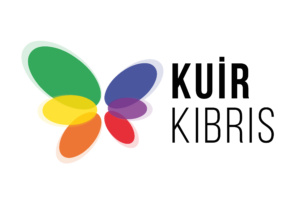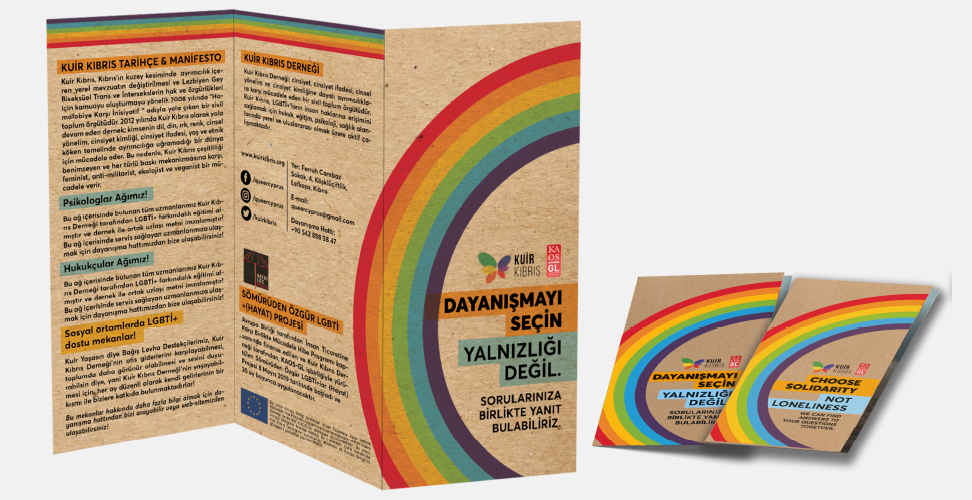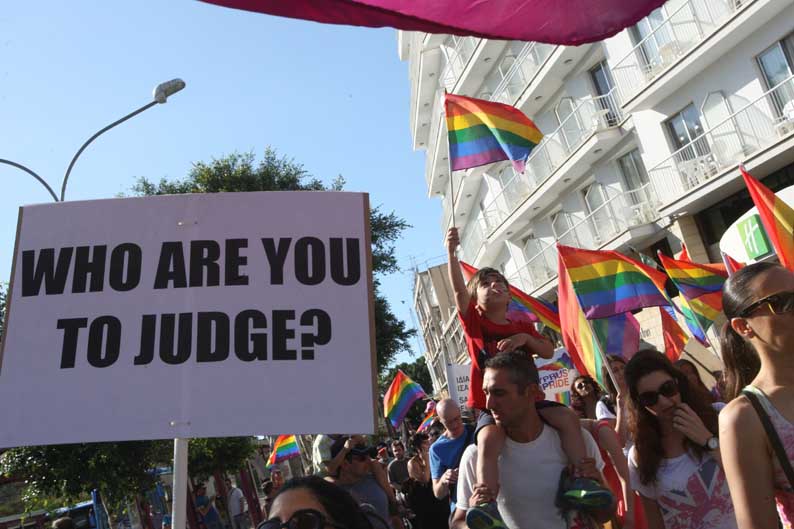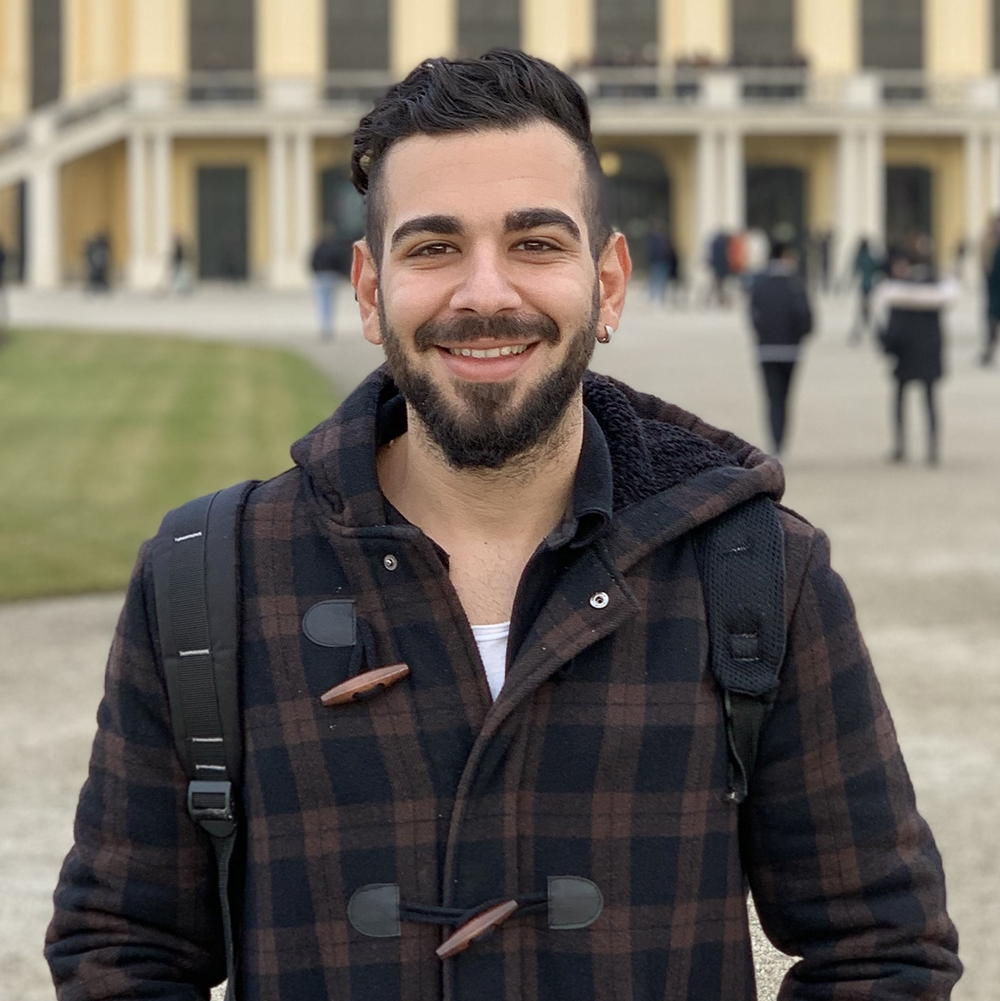Can you start by telling me a bit about yourself? How did you initially become involved in LGBTI activism?
It was about six years ago after I saw an announcement from the association for the social gathering event. I attended the event, and since then, I have been a part of the organization.
To give some background, until 2014, we had a law against sodomy, effectively making it illegal to be gay. It was a law that had been in place since the colonial British law code. In 2007, before the Queer Cyprus Association (QCA) existed, and before people were out and proud in public, there was a considerable stigma [against being gay] — the law prohibited everything. The QCA started as an initiative against homophobia. After several advocacy meetings with the EU and other organizations, the legal text criminalizing homosexuality was lifted in Cyprus. It was replaced by more protective laws, including provisions that criminalized libel based on hate towards actual or perceived sexual orientation and gender identity, the expression of psychological and economic violence based on these grounds, and discrimination on these grounds in accessing public services.
In 2012, the QCA became an official NGO. They held their first Pride march in 2014, but it was very low-key because it was the first time the law had changed, and hatred was still there. I went to the Pride, but I did not march since I was very new to the whole thing. Instead, I was in another part of Pride, observing the entire thing. Then a year later, I physically joined in, and I also took part in the actual organization. However, until 2016, everything was frozen for QCA. They were not very active, but they got funding from the EU’s “Unspoken” project. At the time, they had zero capacity, very few members, and the members they had were very fed up with the whole system because they had been combatting [homophobia] anonymously since 2007. Somehow, they launched a meeting in Nicosia in August 2016, and my boyfriend went. A few weeks later, he said, “Why don’t you come with me to the meeting?” I was supposed to go at that time, but I was apolitical and wasn’t involved in civil society. I was doing everything from my point of view — I suppose you can still call it activism, just in a different sense. Anyways, I went to the meeting, and since then, I’ve been a part of the QCA. I’ve been volunteering for four years, and for the last two years, I have been working professionally with EU-funded projects on human trafficking.
What is your role in the Queer Cyprus Association?
I work in various fields, including advocacy meetings, the educational part, and the health part. In addition, I am involved in writing manifestos, arranging social activities, fundraising, and many more things. Moreover, I have been working as Project Assistant and Communication Officer in the EU-funded LGBTI+ in Freedom from Exploitation Project (LIFE). This project aims to assist LGBTI+ people who are trafficked in the northern part of Cyprus.
Can you tell me more about the Queer Cyprus Association’s foundation?
 We initially came together as the Initiative Against Homophobia (HOKI). In 2007, HOKI applied to the local authorities in the northern part of Cyprus to become a fully established and recognized association. We fought for many criminalized cases — many involving people prosecuted and headlined in the newspapers due to their sexual orientation — and supported by many other NGOs in Greece, Malta, South Cyprus, and Turkey. Then, in March 2012, HOKI went through a constitutional amendment and continued its work under its new name, the Queer Cyprus Association. The QCA aims to promote equal rights for LGBTI people in Cyprus and to eliminate discrimination based on gender, gender expression, sexual orientation, and gender identity. We have been a member of the International Lesbian, Gay, Bisexual, Trans and Intersex Association (ILGA) since 2011.
We initially came together as the Initiative Against Homophobia (HOKI). In 2007, HOKI applied to the local authorities in the northern part of Cyprus to become a fully established and recognized association. We fought for many criminalized cases — many involving people prosecuted and headlined in the newspapers due to their sexual orientation — and supported by many other NGOs in Greece, Malta, South Cyprus, and Turkey. Then, in March 2012, HOKI went through a constitutional amendment and continued its work under its new name, the Queer Cyprus Association. The QCA aims to promote equal rights for LGBTI people in Cyprus and to eliminate discrimination based on gender, gender expression, sexual orientation, and gender identity. We have been a member of the International Lesbian, Gay, Bisexual, Trans and Intersex Association (ILGA) since 2011.
What is it like to be LGBT in Cyprus? What about in Northern Cyprus specifically?
It’s a hard question because Cyprus is divided. I live under occupation of Turkey in the Northern part of Cyprus because I am a Turkish-speaking Cypriot. It’s hard because there is a status quo in all of Cyprus that there is a conflict, and you can see the traces, and because of that, you can see Turkey’s influence over the so-called Turkish Republic of Northern Cyprus (TRNC). The thing is, compared to Turkey, things are much, much better. For example, we can go to parliamentary meetings.
I can see a whole lot of change since 2014. Before that, you couldn’t come out because they would arrest you, and there was violence from the police. No one was speaking about LGBTI people; it was a kind of elephant in the room — everyone knows it was there, but they would do anything to not see the elephant itself and not talk about it.
Being LGBTI is hard in the northern part of Cyprus, but it is also hard in the Republic of Cyprus at the same time. In the northern part of Cyprus, we fight for all of these rights, but for the Republic of Cyprus, where the Greek Cypriots are living, they adopted some laws from the EU and everything came as a package deal. They were just passing all the laws they needed to be on the EU level and not violate human rights. But since in the northern part of Cyprus there is no legal government that can be part of the conventions — for example, the Istanbul Convention — it is a bit hard because when the law is violated, the conventions are not able to give any directives towards the northern part of Cyprus. While the government has adopted many of these conventions to uphold all these human rights, there is no pressure; they just implement them, but everything just remains on paper. However, the struggle of the NGOs and the level of advocacy is so intense that if we put pressure on the government, and whatever we want to do, we can do it. Somehow, we have this chance to be involved in lawmaking or in other issues. When looking at the influence we have from Turkey, due to the occupation, it doesn’t affect as much as for the Turkish people living in Turkey. But, there are emigrations and the demography is changing, so new issues come up while we are combating specific issues. Compared to the eastern bloc of the EU, I can say that Cyprus is a bit better.
Have you seen a change over the last few years?
Absolutely! In 2008, HOKI presented a request to repeal sections 171, 172, and 173 of the Criminal Code [which criminalize persons who engage in same-sex sexual acts and make them liable to imprisonment for a maximum term of five years] along with a resolution to Fatma Ekenoğlu, the head of the Assembly of the Turkish Republic of Northern Cyprus. In the resolution, we stated that the rules “provide the main framework for regulating discrimination against sexual orientation, and they have not been revised since British colonial time.”
In 2010, HOKI organized an international conference, “Solidarity and Networking Conference Cyprus 2010,” in cooperation with ILGA–Europe and hosted by the Journalists Union. The event emphasized that homosexuality is recognized as a crime in Northern Cyprus and assessed this as a “violation of human rights.”
Soon after, in July 2011, two men were arrested and charged with “unnatural intercourse,” and the judge said that they should be held in custody for a day. HOKI publicized the case and others followed suit, calling for a change in the law. In a similar incident in October 2011, five men, one of whom was a former Minister of Finance in the Republic of Cyprus, were arrested and detained on charges of “unnatural intercourse.” During remand hearings, all the detainees, apart from the former minister, reported being beaten by the police. HOKI raised the alarm at the arrests which led to protests from members of the European Parliament and international human rights organizations. HOKI also put forward that the Northern Cypriot media normalized hatred in their reporting and fed homophobic reports and comments to the public. On a more positive note, that same year, HOKI hosted ILGA-Europe’s exhibition “Different Families, Same Love” in the North part of Nicosia. The opening received positive press coverage and provided different and positive facets of the LGBTI community to the general public.
On May 17, 2016, following the open call from the QCA, together with Envision Diversity and MAGEM, the 17th May Organization Committee was formed. As a result, eleven civil society organizations and a Gender Equality Platform representing 21 political parties, trade unions, civil society organizations co-organized a series of events and a march during the week of the International Day Against Homophobia Biphobia and Transphobia.
Since 2007, QCA has played an essential role in raising awareness regarding the rights of LGBTI+ people. Unfortunately, no one in society talked about LGBTI+-related issues because those issues were seen as a mere myth. However, through the advocacy efforts of the QCA, the law that prohibited sodomy was changed and replaced with a new article criminalizing hate speech toward LGBTI+ people, as discussed above. These changes affected the LGBTI+ movement positively and caused society to become more aware of LGBTI+ rights. Even though the law changed in 2014 and seven years seems like a short amount of time, the QCA achieved a lot. However, there are still lots of issues that remain untouched and need to be changed.
Can you tell me more about the media’s reaction to LGBTI rights in the Northern part of Cyprus?
In 2011, when we raised the alarm, the media exposed people, and there were human rights violations everywhere. But when the law changed, the unions started to adopt guidelines in their agendas and governing structures to be more LGBTI-friendly and not violate human rights in terms of gender. We can see that the way that the QCA implemented the ‘Unspoken’ totally directed the media. There were media campaigns, and we researched the newspapers. We documented all the human rights violations. We created media tool kits that discussed LGBTI-sensitive language and featured examples from newspapers that illustrated inappropriate language used in their articles. We have also hosted training sessions, and we saw that the media started to treat LGBTI people a lot better because they received the training and had the toolkits in their hands. We are still monitoring the media. Each year we publish a report and do advocacy meetings with the media. Suppose we see any problems in their articles. In that case, we report them to the agency that governs the media or, since Cyprus is small, we reach out to the person and arrange a meeting to explain why what they did was wrong and make some suggestions on how it could be said better. We now see that the number of violations is much less than when we started. And recently, the government passed protective laws against hate speech in the media.
What are some of the services you provide?
 We provide many social welfare services. For example, especially during the Covid-19 pandemic, we provide food aid, raise money for LGBTI people who are vulnerable and provide employment counseling to increase access to employment. We also have a psychological counseling service and a legal consultancy service for the LGBTI+ community. All of these projects are free for people who are facing economic discrimination and who are in need.
We provide many social welfare services. For example, especially during the Covid-19 pandemic, we provide food aid, raise money for LGBTI people who are vulnerable and provide employment counseling to increase access to employment. We also have a psychological counseling service and a legal consultancy service for the LGBTI+ community. All of these projects are free for people who are facing economic discrimination and who are in need.
We established our solidarity line after the second Pride march due to the cases of violence. We saw a need for the solidarity line because people started posting on social media that violence was becoming more common, so we wrote a small project. We applied to Civic Space, an organization that helps all the NGOs in the northern part of Cyprus — if the NGOs are collaborating with the Greek Cypriots, they help in the Republic of Cyprus as well. As a result, we received a small grant and established our solidarity line, a confidential service that aims to answer questions about LGBTI+ struggle, sexual orientation, and gender identity. The solidarity line has been operating for four years now and is open seven days a week, from 10 am to 10 pm. Now, we are trying to increase the capacity of the solidarity line to have it operating 24/7 because we know that cases are happening after at night, especially with sex workers.
Can you tell me more about organizing the first Pride march in Northern Cyprus in 2014? What was the public reaction?
 Queer Cyprus organized the first Pride march to celebrate after lawmakers in Northern Cyprus abolished the Criminal Code provisions that punished consensual sexual acts between adult men with five years of imprisonment. Further, new provisions that criminalized libel based on hate towards actual or perceived sexual orientation and gender identity (SOGI) were adopted. Thus, the first Pride march empowered queer people and our contributions to the flourishing of humanity.
Queer Cyprus organized the first Pride march to celebrate after lawmakers in Northern Cyprus abolished the Criminal Code provisions that punished consensual sexual acts between adult men with five years of imprisonment. Further, new provisions that criminalized libel based on hate towards actual or perceived sexual orientation and gender identity (SOGI) were adopted. Thus, the first Pride march empowered queer people and our contributions to the flourishing of humanity.
We started with very few people — even I was not there, I was just watching it from afar. Since 2014, we have grown and grown. We created the May 17 Committee, where many political organizations, political parties, and NGOs join together and arrange everything. This intersectional structure led us to reach more people and have a more enabling environment for the entire population who come from different backgrounds and who have different political ideologies and struggles, allowing them to take action. Each year, the number of attendees increases, but the number of violence cases is equally rising. As we become more visible, the more violence there is. As everywhere else, it is a cultural shock to organize Pride months. Religion, traditions, and cultural stereotypes were used by people fighting back, claiming that this is not what is supposed to happen and should not be normalized and naturalized.
I also read that in 2019 you formalized your cooperation with the Greek Cypriot organization Accept-LGBTI Cyprus. Can you tell me more about that process? How has the island’s physical divide affected your work?
We collaborate a lot because we have a common struggle. Since 2014, we have been attending their Pride, and they have been attending our Pride. There has been some conflict between the organizations that parallel the conflict in Cyprus, but somehow we formed many joint workshops together. We joined our forces, and we attended conflict-resolution workshops and focused on our common ground. Now we can manage to collaborate because we signed a Memorandum of Understanding. We found our weak spots that we need to focus on and our sensitivities. In this way, we know our boundaries, and we know our differences and similarities. We are all Cypriots, and we are all struggling for the same thing.
Since 2019, we have been collaborating more. Before the Covid-19 pandemic started, we sent an application to the United Nations as we thought that because Nicosia is a divided city, why not host a joint Pride? We could still do our own Pride marches on each side, but we could also have one joint event in the buffer zone where people could come from both sides and provide various activities. We thought it would be good for the peace efforts and reconciliation. Unfortunately, Covid-19 happened that year. But, what we did instead was join our forces and create an online Pride. We had one full day of Pride events, starting with the main activities. We had couples from both sides sharing their stories, and it was quite lovely to hear stories about peace and reconciliation, about how people forgot this mess that has been the history of Cyprus.
Before this, we also did some joint catering events for socializing. But, unfortunately, at that time I was at an ILGA conference so I couldn’t be there. But at the conference, there was one Turkish Cypriot, myself, and one Greek Cypriot, and we were almost crying because it was the first bi-communal, big event, and everyone was there, all the embassies were there, so somehow we had our own Pride. But we were so sad to miss the one in Cyprus because it was one of the historical moments — it even made the Washington Post!
How has Covid-19 affected your work?
Like most fields, it was hard to cope with initially, but things got smoother, and we managed to switch our training, meetings, conferences, and even parties to online platforms. Organizing with the other side of the island helped keep the bond like it was and might have made it even better, especially regarding bi-communal events.
We have been implementing more projects in the Covid-19 pandemic. It is affecting us more financially because everyone is suffering from a financial crisis. But we became more involved and active on social media; we reached more people and created more online events, such as parties with the Greek Cypriots, gaming nights, training, seminars, and even a conference where 200 people attended. So somehow, we managed to deal with everything. We had a conference that was supposed to have a capacity of 100 people, but it turned into 300 registering and 250 active listeners for one day. It was quite nice that we managed to create this. We sent them promotional materials and kitchen catering services to their homes with credits. Somehow, we managed in the Covid-19 pandemic with different platforms, and the activism kept going in different dimensions. I think it affected us more efficiently. Financially, we reached more people who needed help, so we needed more money for food aid and other support. Still, it helped us reach more people and reach the greatest extent of the whole population because they started using social media more.
I have an amusing story about Covid-19 and the social media events. It was, I think June, when they lifted all the curfews — before then, it was impossible to go out. We couldn’t even leave one part of the city to go to another. During this whole time, we had been doing live shows on YouTube and Facebook. When they lifted everything, I went to a beach party, and there were small restaurants around, and there was a teenager and her mom there selling food, so I went there to check the menu. I had the QCA logo on the back of my shirt, and the girl recognized me from the news somewhere, and she was like, “Are you from QCA?” and I said yes. She was acting like I was Britney Spears! Then her mum came over and explained that she loved QCA. The pandemic helped us reach this new generation and reach their level of understanding regarding activism. It’s a very nice story for me, especially to see that the mum was there as well; I hadn’t expected that reaction from her mum at all. It’s nice to see that things are changing.
How can readers support your work?
To start, they can support us by getting closer to the organization and volunteering. They can also become regular donors and show solidarity with us to empower ourselves to make our voice more robust, make our human rights advocacy more sustainable, and reach more people by ensuring the continuity of the services we provide. This support is vital to meet the increasing demands in the Covid-19 pandemic.

